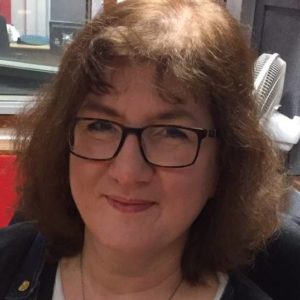 Photo: Dominic Cotter I’m delighted to welcome Debbie Young back to the blog. When I worked it out, I realised we’d known each other for over ten years!
Debbie is the author of nine hilarious, heartwarming mystery novels, two of which were shortlisted for the Selfies Award for Best Independently-published Adult Fiction in the UK (2020 and 2021). She is also a course tutor for Jericho Writers, UK Ambassador for the Alliance of Independent Authors, and the author of various guidebooks and blog posts for authors.
Her fiction is inspired by life in the Cotswold village of Hawkesbury Upton, where she has lived for the last thirty years and by the girls’ boarding school where she worked for thirteen years. She writes in a wooden hut built by her Scottish husband at the bottom of the garden, which she likes to think of as her Little House in the Big Woods, though with fewer bears and a more dependable supply of coffee.
Over to Debbie who is serious about series!
Like most avid readers, I love to discover a good series of books, knowing that each new title I pick up will transport me to familiar territory in the company of characters who feel like old friends (Carina and Aurelia Mitela, I’m looking at you) – or indeed enemies in case of the characters one loves to hate (boo to you, Mr Renschman!). It’s like relaxing in your holiday home rather than exploring new destinations, and in my view, there’s plenty of time for both.
So at the start of my career as a novelist, it was second nature to plan to write not just a novel, Best Murder in Show, but a series of seven – yes, seven! – books. It’s so much easier to revisit a world I’d already created than to have to build new foundations for every book.
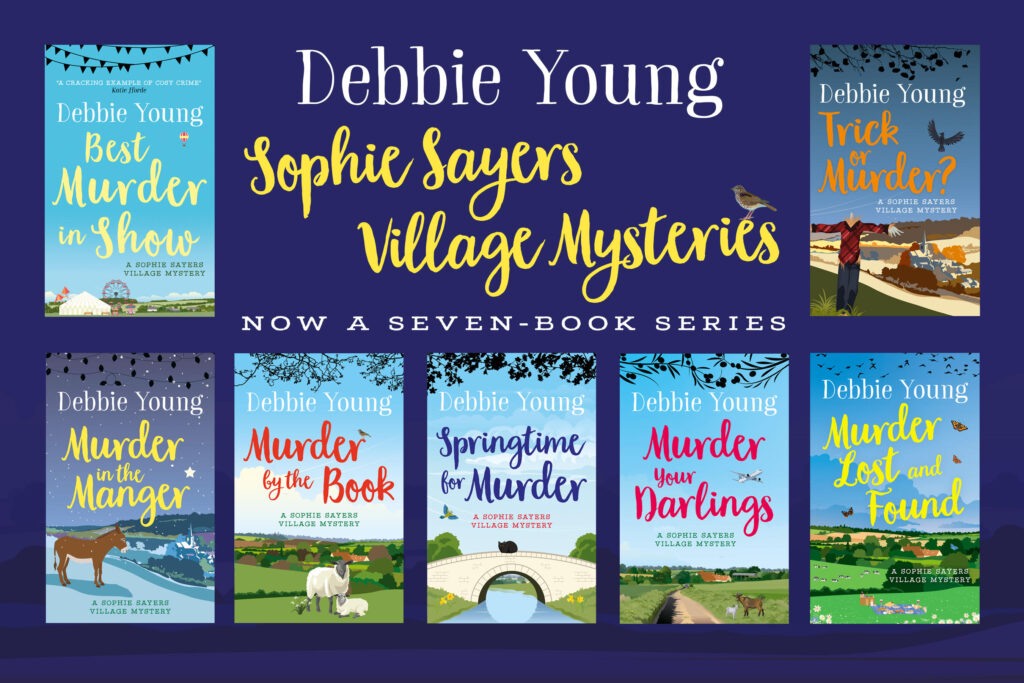
Readers and writers aren’t the only ones who loves series – publishers do too. As with any commodity, it’s easier to sell a new variant of an established, popular product (strawberries-and-cream KitKat, anyone?) than to flog a whole new concept. (What a bold innovation the Curly Wurly was!)
Of course, not all stories lend themselves to series. If a character’s growth and development is completed, resurrecting them beyond “The End” may prove dull. However, in the kind of series that depends purely on action, and in which the characters remain unchanged from start to finish, a series may go on indefinitely. (“The name’s Bond, James Bond…”)
Should a great series therefore never end, or is it better to always leave readers wanting more? Certainly each story should end with closure rather than a cliffhanger. Personally, I’m wary of series that go on for too long. They can lose their edge and their originality. One of my favourite fiction series, which I shan’t name out of respect for the late author, became so contrived after the twelfth book that I stopped reading. I sensed the author also felt it had run its course but was obliged to keep going for her publisher’s sake. Publishers never like to retire golden-egg-laying geese and generally demand a new book each in year in a bestselling series.
One might assume that indie authors like Alison Morton and I might feel under less pressure and therefore publish at their leisure. In my experience, the opposite is true. Without a trade publisher as middleman, we have a very close connection with our readers. As I’m sure is also true for Alison, as soon as I release a new book, readers start asking when the next one will be out. There may be no let-up, but, frankly, it’s a good problem to have, knowing that readers are so enjoying your work.(Too true – Alison)
We have both also both launched additional series, adding to our workloads, Alison’s a new contemporary thriller series kicking off with the gripping Double Identity. After the fifth Sophie Sayers book, I started a second series of novels, then a third of novelettes. This tactic helped to keep my first series fresh.
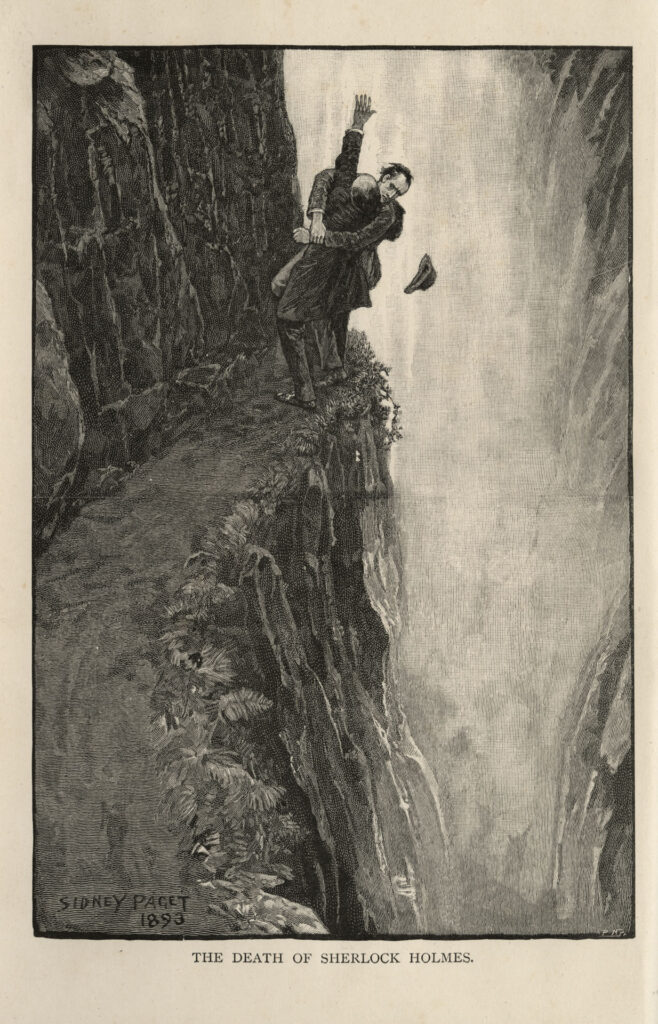 Sherlock Holmes and Professor Moriarty at the Reichenbach Falls, Sidney Paget, The Strand Magazine, December, 1893 (Public domain via Wikimedia) Too many authors end up resenting their leading characters. I didn’t want that to fall into the same trap as Sir Arthur Conan Doyle, who, weary of Sherlock Holmes and desperate to write in other genres, sent his consulting detective on a one-way trip to the Reichenbach Falls, only to have to resuscitate him a few years later for further adventures.
Hats off to Lee Child, who found a different way of escaping from the demands of his protagonist after a 25-year run of annually-published novels. Rather than retiring Jack Reacher, he retired himself, delegating future Reacher novels to his brother, already an author in his own right.
Twenty-five novels – that’s a LOT of books. But how many is too many? And how many books constitutes a series in the first place? Technically, any book with a sequel is a series (a duology), but many authors like to write a trilogy or more. The reason I chose seven for my Sophie Sayers Village Mystery series is that I wanted to chronicle Sophie’s first year in her adopted Cotswold village and needed that many to accommodate the many events of the typical rural year, from one summer to the next.
I’m also a fan of putting an upper limit on a series of novels so that it doesn’t lose its bite, something that is demonstrable in television series. Compare the brilliance of the twelve episodes of “Fawlty Towers”, for example, with the 295 of “Last of the Summer Wine” – apparently an endlessly replenishing bottle of summer wine, like the magic pint of Guinness in the old joke, until the BBC finally pulled the plug after Season 31.
However, I always give the last call to my readers: in response to their protests that Murder Lost and Found should be the final book about Sophie Sayers, I’m now planning an eighth (and final? – the jury is still out!) novel. Sophie also features in my Tales from Wendlebury Barrow series of novelettes, and even puts in a guest appearance in my novels set at St Bride’s School. The eccentric girls’ boarding school of the title is just down the road from Sophie’s village of Wendlebury Barrow. One canny reader even suggested that Sophie join forces with Gemma, the central character at St Bride’s, to solve a mystery together. Clearly there’s more ways than one to keep a series spinning.
My final piece of advice is for readers: if a favourite author sidesteps from your favourite series, follow her and give the new series a chance, even if it’s in a completely different genre. You never know, it could be the start of a whole new addiction.
Words of truth – thank you, Debbie I can’t wait for your next story!
––––––––––
Connect with Debbie
Website: www.authordebbieyoung.com
Twitter: www.twitter.com/DebbieYoungBN
Facebook: www.facebook.com/AuthorDebbieYoung
Instagram: www.instagram.com/DebbieYoungAuthor
––––––––––
Read the first of Debbie’s Sophie Sayers mysteries
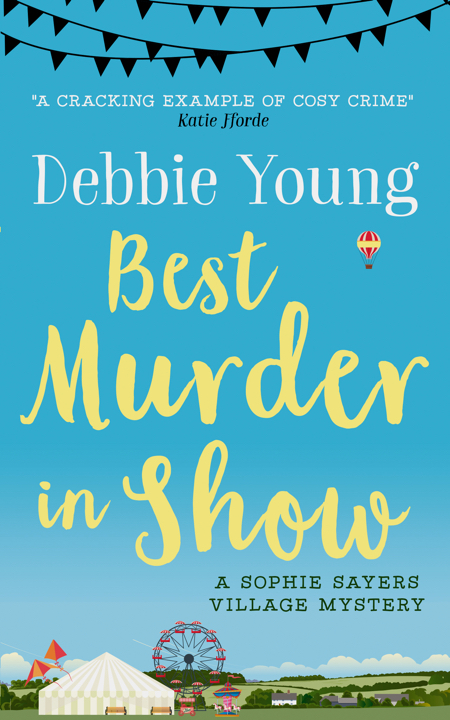 A dead body on a carnival float at the village show A dead body on a carnival float at the village show
A clear case of murder in plain sight, thinks new arrival Sophie Sayers – but why do none of the villagers agree? What dark secrets are they hiding to prevent her unmasking the murderer, and who holds the key to the mystery?
– Hector, the gorgeous but enigmatic owner of the village bookshop
– Joshua, the intrusive yet insightful old man from next door
– Carol, village shopkeeper, the fount of village gossip, not all of it reliable
And what is that mysterious ingredient that almost knocks Sophie out when she takes tea at the village bookshop? (Not the best way to start a job interview.)
Can Sophie unearth the clues tucked away in this outwardly idyllic Cotswold village before anyone else comes to harm, not least herself?
For fans of classic cozy mysteries everywhere, Best Murder in Show will make you laugh out loud at the idiosyncrasies of English country life, and rack your brains to discover the murderer before Sophie can.
Buy this book here
Ebook: https://books2read.com/u/31ryJr
Paperback: https://viewbook.at/BMIS
Alison Morton is the author of Roma Nova thrillers – INCEPTIO, CARINA (novella), PERFIDITAS, SUCCESSIO, AURELIA, NEXUS (novella), INSURRECTIO and RETALIO, and ROMA NOVA EXTRA, a collection of short stories. Audiobooks are available for four of the series. Double Identity, a contemporary conspiracy, starts a new series of thrillers.
Find out more about Roma Nova, its origins, stories and heroines and taste world the latest contemporary thriller Double Identity… Download ‘Welcome to Alison Morton’s Thriller Worlds’, a FREE eBook, as a thank you gift when you sign up to Alison’s monthly email newsletter. You’ll also be among the first to know about news and book progress before everybody else, and take part in giveaways.
If you enjoyed this post, do share it with your friends!Like this:Like Loading...
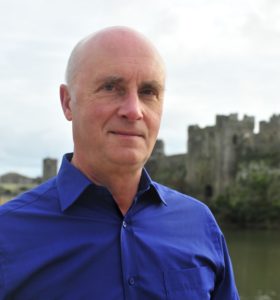 What a question! I’m intrigued about how Tony is going to answer this one… After writing several successful non-fiction books, Tony decided his real interest is in the history of the fifteenth and sixteenth centuries, and now his focus is on writing historical fiction about the lives of key figures of medieval history. What a question! I’m intrigued about how Tony is going to answer this one… After writing several successful non-fiction books, Tony decided his real interest is in the history of the fifteenth and sixteenth centuries, and now his focus is on writing historical fiction about the lives of key figures of medieval history.
His Tudor Trilogy has become an international best-seller and he is in regular demand as a guest speaker about the lives of the early Tudors. This was followed by his Brandon trilogy, about Charles Brandon, his life, career and his complex marriages including with Mary Tudor, princess of England and Queen of France.
Tony’s blog, The Writing Desk, has well over a million visitors, and his popular podcast, Stories of the Tudors has had over 90,000 downloads. Tony returned to Pembrokeshire, an area full of inspiration for his writing, where he lives with his wife. In his spare time he enjoys sailing and sea kayaking.
Over to Tony!
I was born in Pembroke, not far from the impressive castle which was the birthplace of Henry VII, the first Tudor king. I couldn’t find any well researched novels about his life, so began collecting primary sources, and soon found I had enough material for at least three books. These became my Tudor trilogy, with Henry born in the first book, coming of age in the second, and becoming King of England in the third.
The trilogy became a best-selling series in the US, UK and Australia. Then came a series of questionable television dramas. These took liberties with the facts (like ‘merging’ Henry VIII’s sisters), and it was much the same when I studied history at school. I remember how we went straight to Henry VIII and his unlucky wives – then on to Elizabeth I seeing off the Spanish Armada.

I can understand anyone who suggests authors should avoid the Tudors as they’ve already had more than enough attention. When I began my research, however, I soon discovered the wealth of information which will be new to all but the most well-informed readers.
Writers such as C J Sansom, with his Shardlake series, and Hilary Mantel’s Wolf Hall trilogy inspired me to really thing about the world of the Tudors. I decided to follow the Tudor trilogy with a ‘sequel’ which explored the less well known but fascinating life of Henry VIII’s youngest sister, Mary, who became Queen of France and risked everything to marry Charles Brandon, Duke of Suffolk.

This led to my popular Brandon trilogy, and visits to the actual locations in Suffolk and Lincolnshire. A particularly poignant moment was when I visited St George’s Chapel in Windsor Castle and saw Brandon’s tomb. I was also able to visit Grimsthorpe Castle, where he lived with his last wife, Katherine Willoughby and see the famous portraits of them side by side.
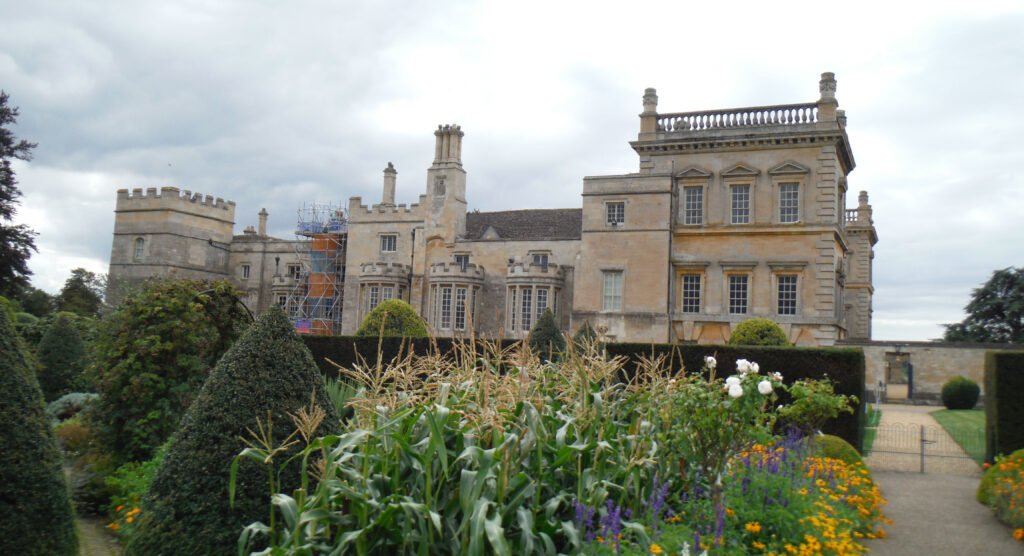 Grimsthorpe Castle I realised my books provided a continuous line, telling the stories of the Tudors from Owen Tudor’s first meeting with Queen Catherine of Valois. I’m now working on an Elizabethan series, which will bring the intriguing world of the last Tudor queen to life.
––––––––
For more information about Tony, do visit his website tonyriches.com and his blog The Writing Desk.
You can find him on Facebook and Twitter @tonyriches
––––––––
Read Tony’s latest about Robert Devereux, Earl of Essex
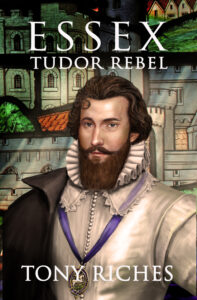
Robert Devereux, Earl of Essex, is one of the most intriguing men of the Elizabethan period. Tall and handsome, he soon becomes a ‘favourite’ at court, so close to the queen many wonder if they are lovers.
The truth is far more complex, as each has what the other yearns for. Robert Devereux longs for recognition, wealth and influence. His flamboyant naïveté amuses the ageing Queen Elizabeth, like the son she never had, and his vitality makes her feel young.
Robert Devereux’s remarkable true story continues the epic tale of the rise of the Tudors, which began with the best-selling Tudor trilogy and concludes with the reign of Queen Elizabeth I.
Buy from Amazon: US UK Canada Australia
Alison Morton is the author of Roma Nova thrillers – INCEPTIO, CARINA (novella), PERFIDITAS, SUCCESSIO, AURELIA, NEXUS (novella), INSURRECTIO and RETALIO, and ROMA NOVA EXTRA, a collection of short stories. Audiobooks are available for four of the series. Double Identity, a contemporary conspiracy, starts a new series of thrillers.
Find out more about Roma Nova, its origins, stories and heroines and taste world the latest contemporary thriller Double Identity… Download ‘Welcome to Alison Morton’s Thriller Worlds’, a FREE eBook, as a thank you gift when you sign up to Alison’s monthly email newsletter. You’ll also be among the first to know about news and book progress before everybody else, and take part in giveaways.
If you enjoyed this post, do share it with your friends!Like this:Like Loading...
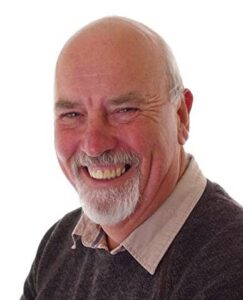 I’m delighted to welcome the return of David Ebsworth to the blog as this week’s ‘writer abroad’. DAVID EBSWORTH is the pen name of writer Dave McCall, a former organiser for Britain’s Transport & General Workers’ Union. He was born in Liverpool but now lives in Wrexham, North Wales, and in Alicante, Spain. David took up writing historical fiction full-time after his retirement and ‘A Betrayal of Heroes’ is his tenth novel. I’m delighted to welcome the return of David Ebsworth to the blog as this week’s ‘writer abroad’. DAVID EBSWORTH is the pen name of writer Dave McCall, a former organiser for Britain’s Transport & General Workers’ Union. He was born in Liverpool but now lives in Wrexham, North Wales, and in Alicante, Spain. David took up writing historical fiction full-time after his retirement and ‘A Betrayal of Heroes’ is his tenth novel.
Here he explains how he weaves the research for his novels, keeping his fiction within the limits of historical veracity and maintaining the balance between providing enough background to show all the necessary colour, yet not so much that it causes information dump.
Over to David!
Remember the Marseillaise scene from Casablanca?
Rick’s Café Américain. The Germans down below singing Die Wacht am Rhein. The conflicted faces of the bar’s French and refugee customers. Victor Laszlo’s defiant instruction to the band. “Play the Marseillaise. Play it!” And the band members looking up towards Rick, on the balcony above. Rick’s simple nod of agreement, worth more than a thousand words of dialogue and descriptive setting. The reaction of those onlookers, the trembling voices as they begin to sing the anthem. Their pride, the tears, the tragedy of France under the Nazi jackboot, the determination to be free once more. All captured in one brilliant scene. (You can watch the scene from the film here.)
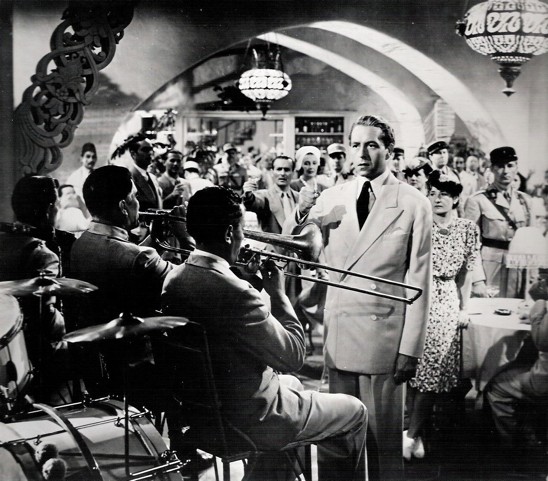
Brilliance to which I can only aspire.
Yet, in my own way, it’s just how I try to write historical fiction. The protagonist’s story, the attitudes and events driving my main characters, the reactions of supporting players, the settings, must be specific to the age in which the novel’s set and themselves part of the story.
And it’s no coincidence that I chose the Casablanca scene to illustrate this point about holistic research.
My third Jack Telford novel, A Betrayal of Heroes, is published this month (14th July). I had to build a timeline for the relevant history thread from 1939 until 1945, and mainly – from 1940 onwards – the story of Free France. Then to research and plot Jack’s travels and trials through that history. From Casablanca itself to Brazzaville, from the beaches of Normandy to the Liberation of Paris.
This is also the story of Spanish Republican soldiers who, having survived their own civil war, went on to serve within the ranks of the Free French army, to continue their fight against fascism and Europe’s Nazis until the end of the Second World War. I’ve many personal connections to the Spanish Civil War. But I think of myself as an amateur Francophile, as well. So, here – a perfect storm. Spain, its civil war and the fight for the Liberation of France – all rolled into one yarn.
Telford, my protagonist, must survive in wartime North Africa. He must abandon his old life as a Sunday newspaper journalist to take up a new role as a war correspondent. And he must adapt to life with the military, a section of Leclerc’s Free French army.
It’s fairly easy to build accurate scenes of Europe during the Second World War. But Oran? Rabat? Brazzaville? The towns of Chad? It was getting to be a struggle, until I stumbled across the archive of maps in the University of Texas Libraries. These are detailed street maps produced in 1942 by the US Army Map Service for every major city in North Africa. Those maps led me to a similar cache of plans for the towns and cities of Gabon, the French Congo, Chad and so on. And from those maps I was able to construct the realistic settings for Jack Telford and his associates to populate.
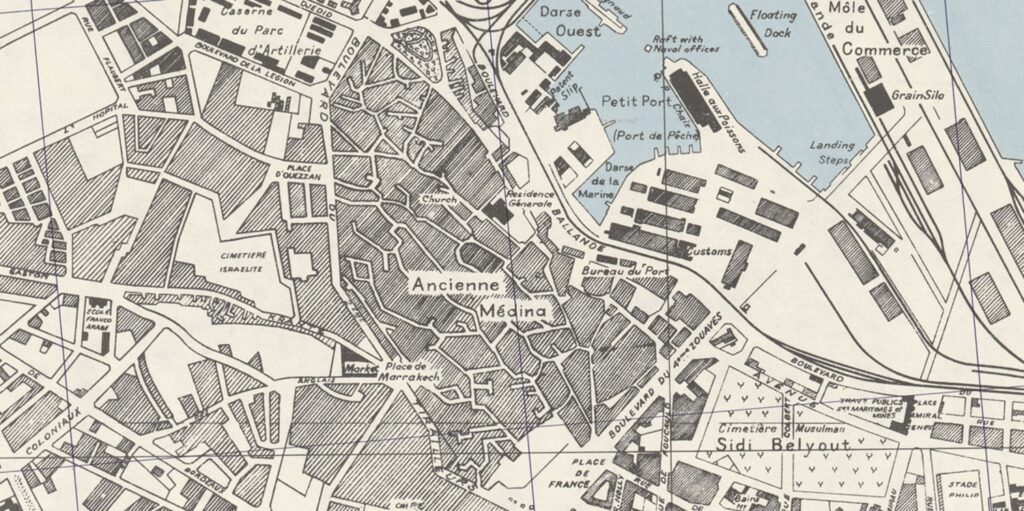
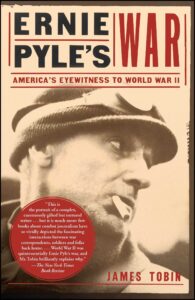 For Jack’s career development, I studied the Second World War’s frontline journalists, men and women, so I could “teach” Jack how to be a war correspondent. I especially liked the work of American Pulitzer Prize-winning Ernie Pyle. I fell in love with Ernie Pyle’s writing – but it wasn’t Jack. And then I came across another winner of the Pulitzer for his war correspondence, Hal Boyle. I picked up a collection of Boyle’s writings, almost essays, almost Alastair Cooke. For Jack’s career development, I studied the Second World War’s frontline journalists, men and women, so I could “teach” Jack how to be a war correspondent. I especially liked the work of American Pulitzer Prize-winning Ernie Pyle. I fell in love with Ernie Pyle’s writing – but it wasn’t Jack. And then I came across another winner of the Pulitzer for his war correspondence, Hal Boyle. I picked up a collection of Boyle’s writings, almost essays, almost Alastair Cooke.
From these I was able to build and research what, I hope, are credible pieces of journalism – Jack Telford’s own words but in the style of Hal Boyle.
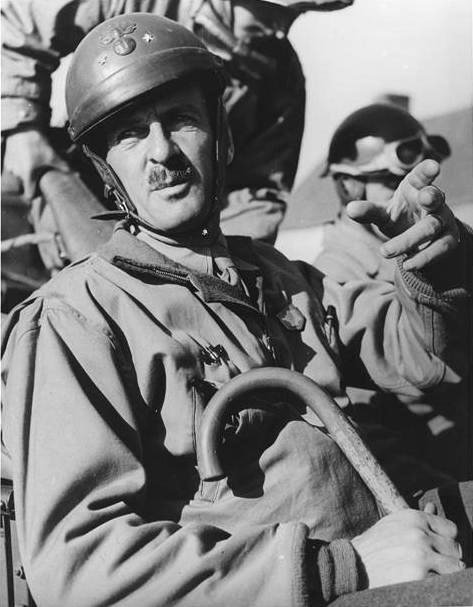 General Philippe Leclerc de Hauteclocque (Photo: John Downey, US Office of War Information, public domain) Finally, Jack and the military. He has to live and breathe among the men and women of Leclerc’s 2nd French Armoured Division for almost eighteen months. And, before that, with Leclerc’s flying columns in Libya – units a bit like the Long Range Desert Group.
Naturally, there were endless non-fiction histories and autobiographies for the period. But I learned so much more from another lucky find. Robert S. Coale – Bob Coale – is Professor of Hispanic Studies at the University of Rouen. And Bob – with his encyclopaedic knowledge of Leclerc’s Division and the former Spanish Republican soldiers who fought within its ranks – helped to steer me through the learning curve.
There we have it. Just a few of our journeys to build and research a credible background while writing A Betrayal of Heroes. I just hope folk enjoy reading it as much as I loved the writing. Vive la France!
—————
Find out more about David
Website and blog: https://www.davidebsworth.com/
Facebook: https://www.facebook.com/EbsworthDavid
Twitter: https://twitter.com/EbsworthDavid @EbsworthDavid
—————
Read A Betrayal of Heroes
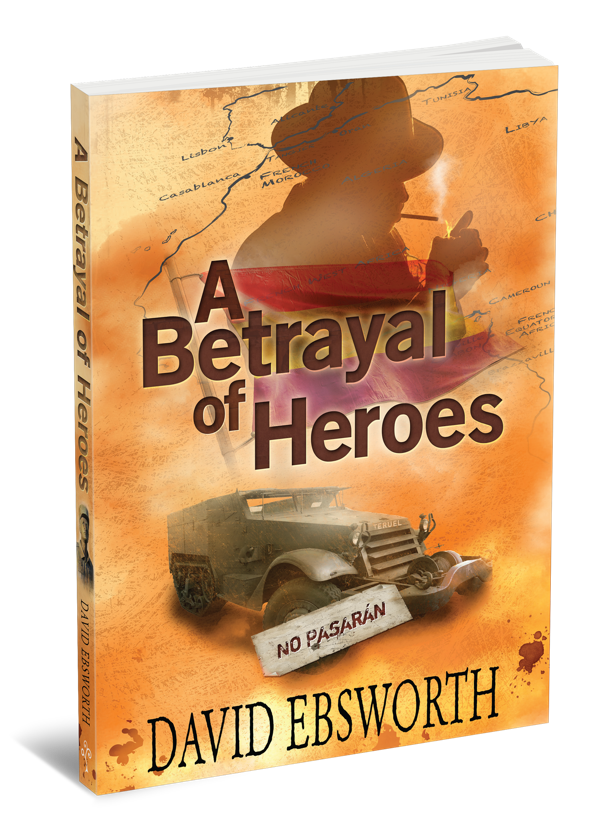 ‘Swear,’ Leclerc shouted, ‘that you will never lay down your arms until our colours, our beautiful colours, are flying afresh on Strasbourg Cathedral!‘ ‘Swear,’ Leclerc shouted, ‘that you will never lay down your arms until our colours, our beautiful colours, are flying afresh on Strasbourg Cathedral!‘
Headstrong newspaperman Jack Telford’s weapon is his pen, but the oath he’s taken at Kufra will still bind his fate to the passions and perils of the men and women who shape his life – his personal heroes, like the exiled Spanish Republicans now fighting for Free France.
But from Oran and Casablanca to the heart of Africa, then into the cauldron of Normandy and the Liberation of Paris, Jack’s fate is also bound to those who will betray them, and to the enemies who want Telford dead.
Buy this book from a wide variety of retailers:
https://www.davidebsworth.com/portfolio/betrayal-of-heroes
—————
This is the last of the ‘writers abroad’ series and it’s a storming one to end on! But there are more guests in the pipeline…
Alison Morton is the author of Roma Nova thrillers – INCEPTIO, CARINA (novella), PERFIDITAS, SUCCESSIO, AURELIA, NEXUS (novella), INSURRECTIO and RETALIO, and ROMA NOVA EXTRA, a collection of short stories. Audiobooks are available for four of the series. Double Identity, a contemporary conspiracy, starts a new series of thrillers.
Find out more about Roma Nova, its origins, stories and heroines and taste world the latest contemporary thriller Double Identity… Download ‘Welcome to Alison Morton’s Thriller Worlds’, a FREE eBook, as a thank you gift when you sign up to Alison’s monthly email newsletter. You’ll also be among the first to know about news and book progress before everybody else, and take part in giveaways.
If you enjoyed this post, do share it with your friends!Like this:Like Loading...
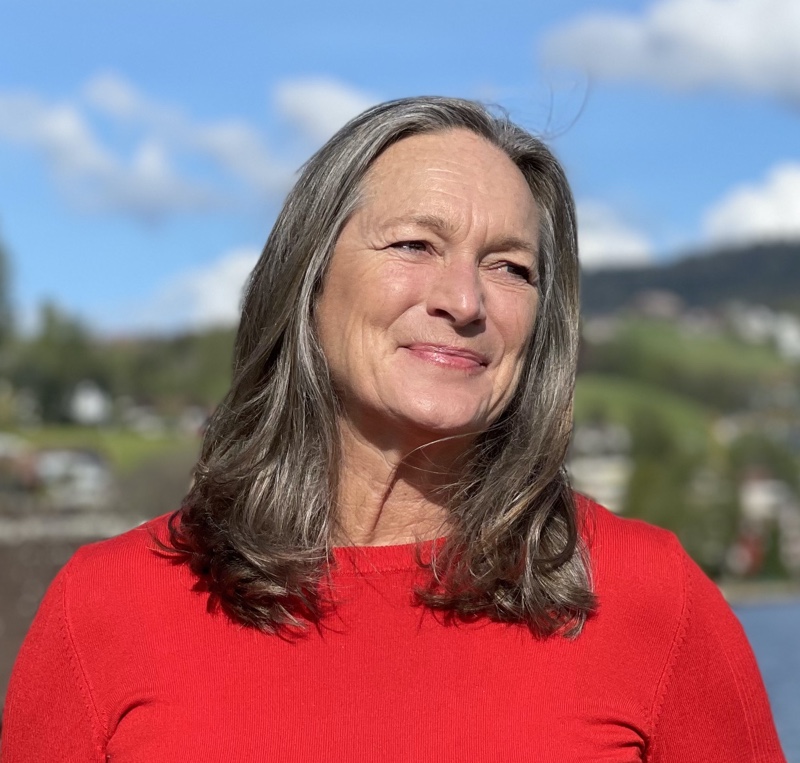 I’m delighted to welcome a second ‘writer abroad’ from Switzerland and another crime fiction writer – see JJ Marsh, my first guest in this series. (What do they put in the chocolate there?) I’m delighted to welcome a second ‘writer abroad’ from Switzerland and another crime fiction writer – see JJ Marsh, my first guest in this series. (What do they put in the chocolate there?)
Louise Mangos grew up in rural Hertfordshire in the UK but travelled extensively in her twenties, eventually settling in Switzerland where her long love affair with the mountains began. She has published two psychological thrillers and another is set for release in April 2022. Her short fiction has won prizes, been read out on BBC radio and appears in more than twenty print anthologies. She holds a Masters in crime writing from the University of East Anglia.
Over to Louise!
Setting a novel where you live eases the job of adapting the narrative, without periodically stopping the creative flow to research the location. It has long been my opinion that the setting plays an equally important role as the characters in a novel. The writer needs to convey not only the geography, but the climate, culture, senses and quirks of a setting that might be unknown to many of their readers, and it’s more exciting and challenging when these are foreign locations. But when an author actually lives in their setting, these traits are often already ingrained in the creative pool.
 Lake Ägeri (Ägerisee) at Morgarten (Photo: Karl Baer, CC BY-SA 3.0 licence) I’ve lived in several areas of Switzerland for more than half my life. My debut novel is set in the central Swiss village where I currently live on the shores of the Aegerisee (Lake Aegeri). My second novel is set in two locations: a ski resort where I spent much of my twenties, and a women’s prison situated north of Bern. The latter was unknown to me until I began to research penal institutions in Switzerland. Several visits were necessary to get a feel for Hindelbank. As the ski village is a place that actually exists, I wanted the prison to be a real place too.
My latest novel, The Beaten Track, which publishes in April 2022, is set mostly in the Léman region of the French part of Switzerland. But it also spends many chapters on a currently implausible backpacking journey around the world (it is set in the early nineties, to avoid not only the pandemic but also the digital restrictions imposed on crossing international borders unnoticed). Tapping into the journals I kept when I was backpacking around the world on a shoestring budget in the eighties and nineties, I’ve hopefully brought the global settings realistically alive in this psychological thriller.
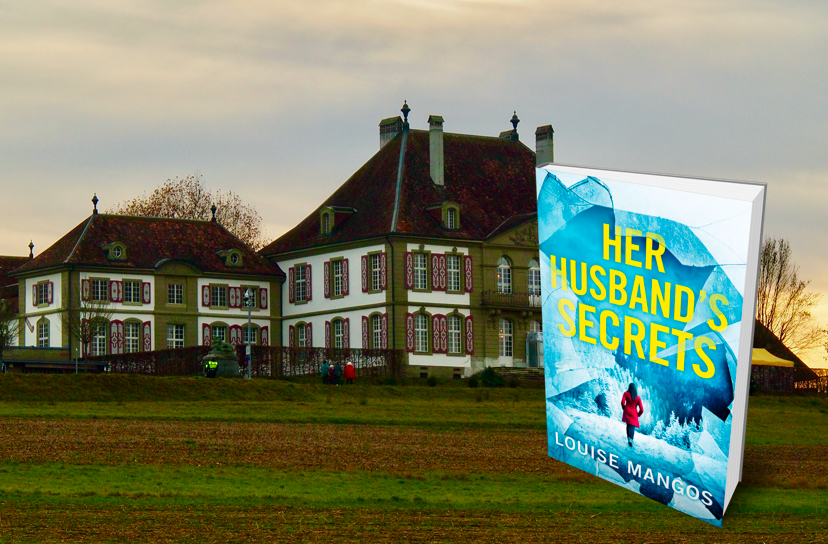
Over this past year many ex-pat writers have been bound to their country of residence, which has distanced us somewhat from where our books are mostly sold in the English-speaking world. But being forced to isolate in the Swiss Alps has not been a great hardship. The most difficult part of the pandemic has been the inability to connect personally with family back in the UK. After the initial anxiety causing writers block at the beginning of the pandemic, living in an isolated mountain village has proven to be one of the best and certainly safest places in the world to write. And it has planted the seeds of new projects.
 The Battle of Morgarten November 1315 (Tschachtlanchronik by Tschachtlan and Dittlinger, c. 1470. Public domain, Zurich Central Library) Stepping outside the comfort zone of psychological thrillers, isolating in Switzerland has given me the opportunity to complete a long-planned novel – a medieval mystery set around the events leading up to the Battle of Morgarten. Should this relatively unknown event in history have ended differently, Switzerland might never exist today.
It helps that I live a short cycle ride from the site of the battle. Immersing myself in the landscape surrounding the village of Morgarten has been a major advantage in conjuring the sense of time and imagined experiences of people living and surviving in that era during the birth of the Helvetic Confederation (today’s Switzerland).
Historical fiction requires far more research than contemporary fiction. Immersing myself in the geography of a place that has changed very little over the past 700 years, has made it easier to write about what life was like back then. Once polished, I’m looking forward to bringing this new genre of mystery to readers.
(And we’re looking forward to reading it, Louise!)
——-
Connect with Louise
Website: https://louisemangos.com/
Facebook author page: https://facebook.com/LouiseMangosBooks/
Amazon author page: https://www.amazon.co.uk/Louise-Mangos/e/B07BTW6FY9
Twitter: https://twitter.com/LouiseMangos @LouiseMangos
Instagram: https://www.instagram.com/louisemangos/
——-
Read Strangers on a Bridge
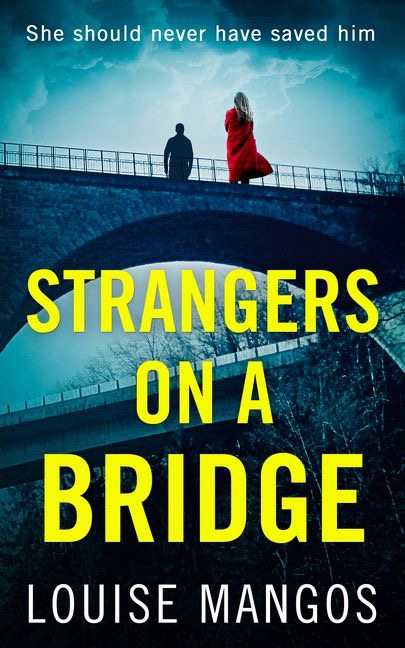 To what lengths would you go to protect your family? To what lengths would you go to protect your family?
When Alice Reed goes on her regular morning jog in the peaceful Swiss Alps, she doesn’t expect to save a man from suicide. But she does. And it is her first mistake.
Adamant that they have an instant connection, Manfred’s charm grows darker and his obsession with Alice becomes stronger.
In a country far from home, where the police don’t believe her, the locals don’t trust her and even her husband questions the truth abut Manfred, Alice has nowhere to turn.
Buy from Amazon: https://mybook.to/StrangersOnABridge
Alison Morton is the author of Roma Nova thrillers – INCEPTIO, CARINA (novella), PERFIDITAS, SUCCESSIO, AURELIA, NEXUS (novella), INSURRECTIO and RETALIO, and ROMA NOVA EXTRA, a collection of short stories. Audiobooks are available for four of the series. Double Identity, a contemporary conspiracy, starts a new series of thrillers.
Find out more about Roma Nova, its origins, stories and heroines and taste world the latest contemporary thriller Double Identity… Download ‘Welcome to Alison Morton’s Thriller Worlds’, a FREE eBook, as a thank you gift when you sign up to Alison’s monthly email newsletter. You’ll also be among the first to know about news and book progress before everybody else, and take part in giveaways.
If you enjoyed this post, do share it with your friends!Like this:Like Loading...
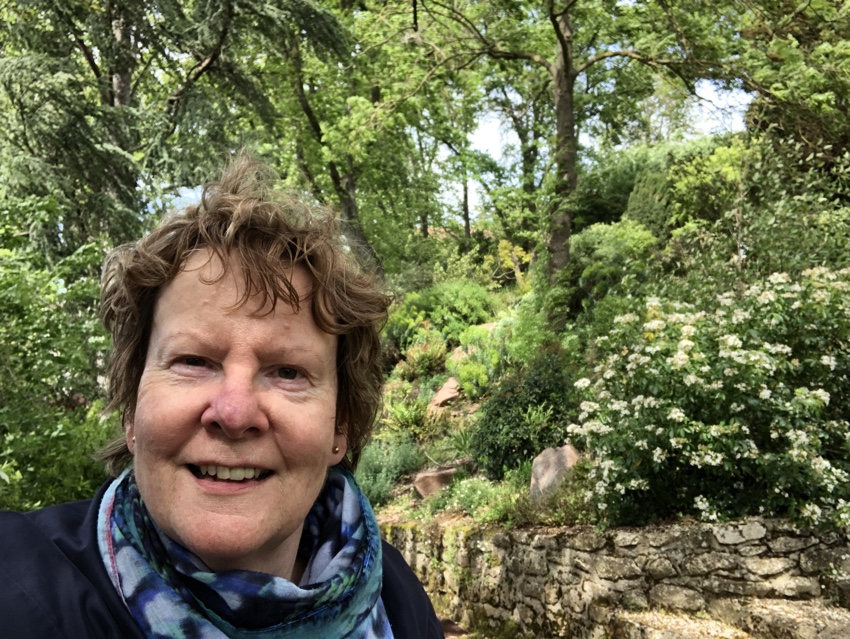 This week in ‘writers abroad’, it’s all about me. When I conceived this series about people living away from their native country or having spent significant chunks of time outside it, I thought it would be amusing and entertaining. But I’ve had so many emails and comments on social media about how inspiring the posts have been, I’ve been thrilled by its success. Nobody could ask for more. This week in ‘writers abroad’, it’s all about me. When I conceived this series about people living away from their native country or having spent significant chunks of time outside it, I thought it would be amusing and entertaining. But I’ve had so many emails and comments on social media about how inspiring the posts have been, I’ve been thrilled by its success. Nobody could ask for more.
We have a few more to enjoy, but I thought I’d slot in a quick personal post just in case anybody’s interested!
My background is mixed! Languages graduate with a history MA, civil servant, bookseller, military officer, specialist antique dealer, translator and now author of ten fiction and two non-fiction books. (More here, if you need a cure for insomnia…)
I moved to France in 2010, but apart from holidaying and studying here, I’ve worked here and am thoroughly immersed in all things French. As a child, I’d played with French speaking children since I was seven years old and I’ve never stopped talking (French) since.

My first degree was in French, German and Economics, so looking beyond my home country into other people’s cultures and lives seems second nature and intensely interesting.
Writing the Roma Nova novels started about a year before I left the UK and was firmly based on my fascination with Ancient Rome. Again, it’s looking into another culture, mindset and way of life. Crossing cultures can be stimulating and challenging; looking into the past even more so.
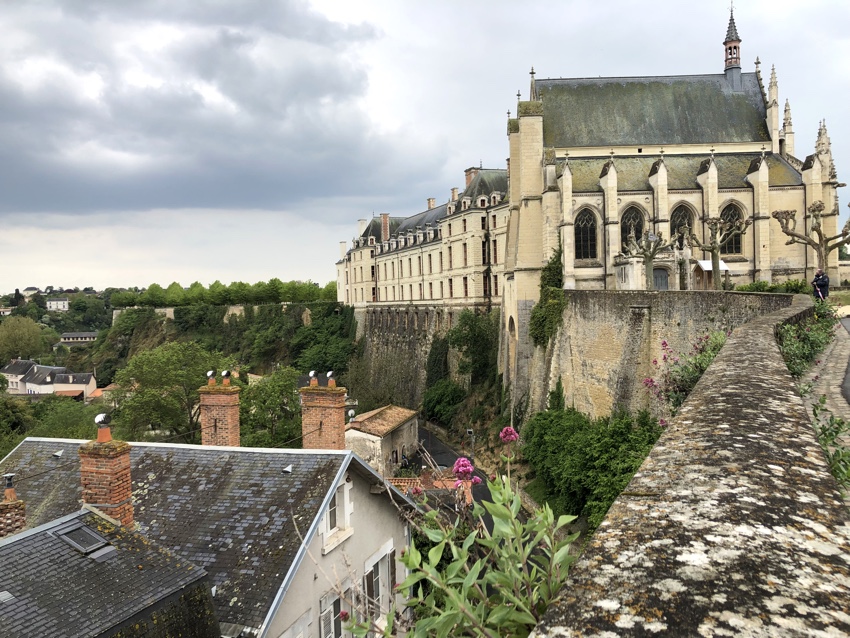 Château de Thouars Inevitably, there is always interaction by the main characters, Carina and Aurelia, with the countries around them, including France.
In NEXUS, Aurelia chats to the French ambassador.
In SUCCESSIO, I was naughty enough to rename Paris’s chief airport ‘Paris-LeClerc’ rather than ‘Charles de Gaulle’ (CDG) as for me General Philippe Leclerc de Hauteclocque was a far better soldier, a man of high integrity and far more straightforward than the much more political de Gaulle. Chacun à son goût…
When it came to writing Double Identity, the first of a different series, I grabbed the chance to give it a French background, something to reflect the place where I live – Poitou. It’s an ancient area, settled before the Romans or the Angevins arrived. Rich grain-producing plains (which many other tribes, states and nations envied and which were often the reason for invading), the navigable rivers, the outstanding beauty of its rolling hills and its rich flora and fauna have marked it out over the centuries.
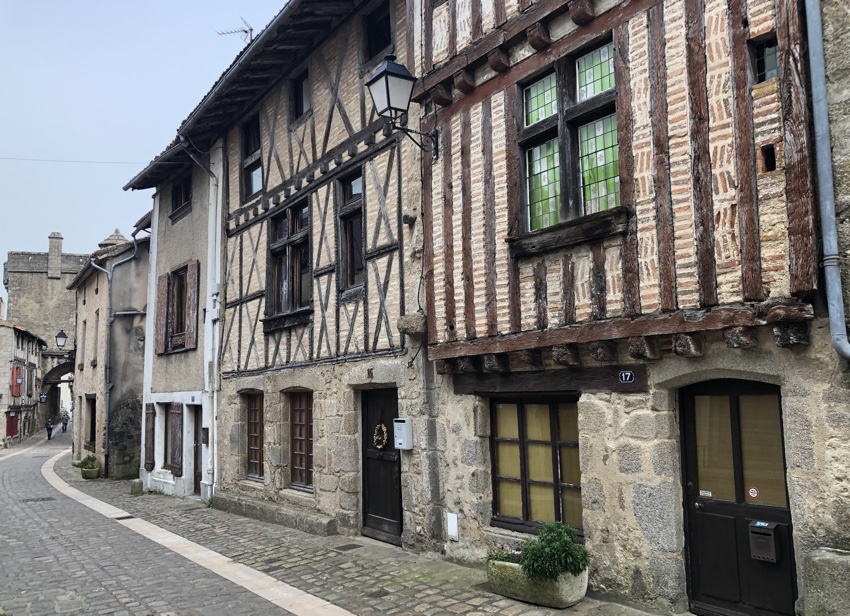 Vieux quartier, Parthenay Today, it’s a mixed urban and rural area, dotted around with châteaux, manors and historic towns such as Poitiers (historical capital city), Châtellerault (France’s kings’ establishment in Poitou), Niort, La Roche-sur-Yon, Thouars, and Parthenay.
In my daily life, I come across a lot of people of mixed and dual nationality and the joys and challenges of that, so I gave new heroine Mel/Mélisende a French father and English mother. Nothing like adding in an extra layer of potential conflict!
For a writer, it’s bliss; history at a few steps away whether ancient menhirs and Roman roads or high medieval forts, Renaissance palaces, Revolutionary mindset, troglodyte dwellings, the Second World War occupation and resistance. The fields and woods look peaceful, yet teem with life and the weather is gentle with long seasons of warmth. Of course, we do get rain, but not that much.
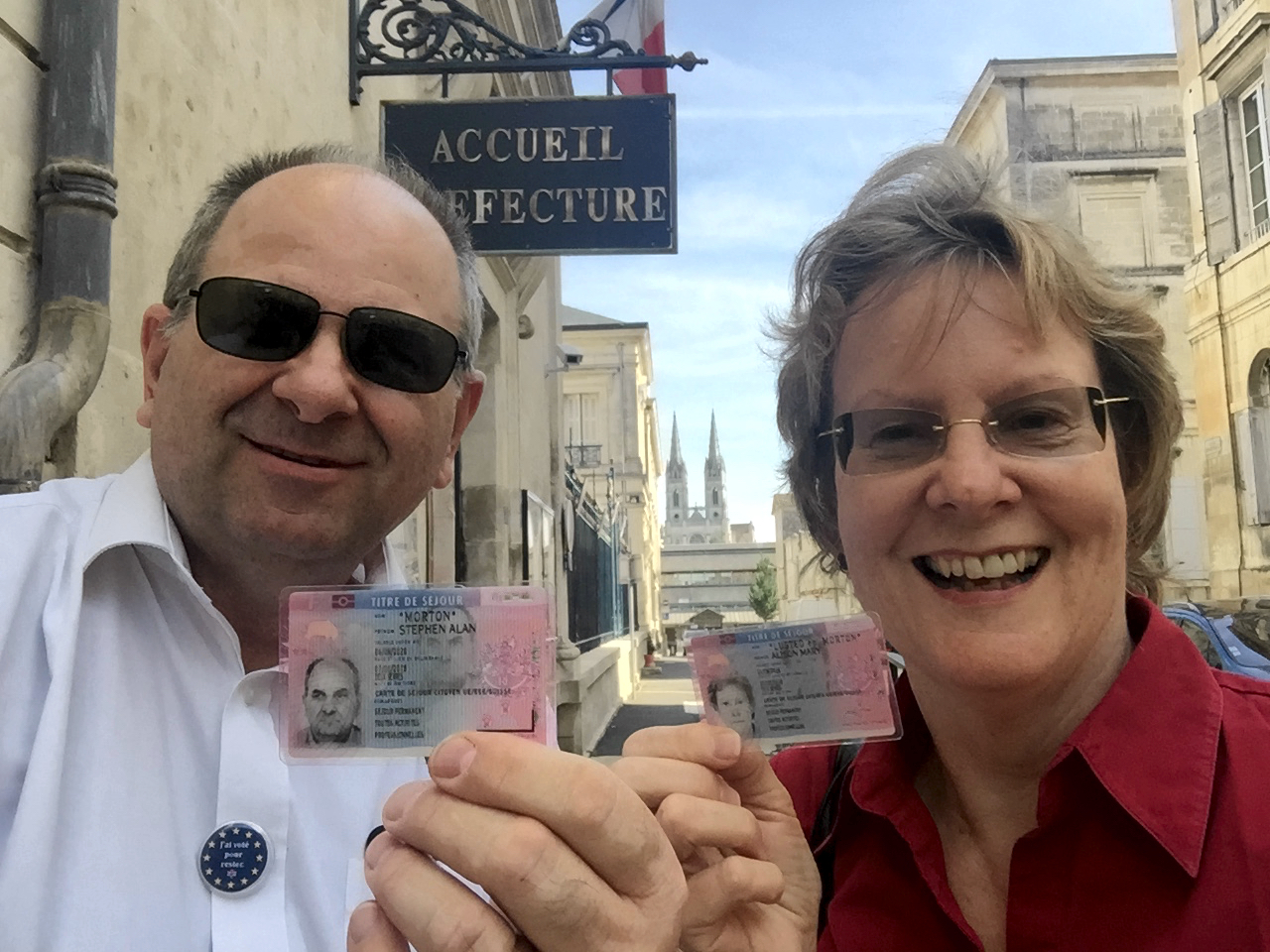 Getting our first residency cards at the prefecture in Niort I’ve taken part in literary events, library sessions, given workshops and have just written my hundredth column about writing and publishing for The Deux-Sèvres Monthly magazine.
Although I’ve also travelled regularly over the past ten years to take part in literary festivals in the UK, US and Ireland, thanks to easy access to local airports, I’m always glad when the plane touches down at Poitiers airport and I’m nearly home.
That’s been on hold for a couple years and I’ve missed it especially talking to readers and fellow writers, but I’ve been lucky to be in a good place and write the second Mélisende thriller in the tranquility of Poitou, my new and her original homeland.
Other posts in this series:
JJ (Jill) Marsh: Switzerland, but not as you know it…
Tracy Warr: Writing medieval fiction in southern France
Vanessa Couchman: The other south of France
Kathleen McGurl: On settings
Jean Gill: Provence – for the love of bees
Cathie Dunn: Carcassonne, a writer abroad’s dream
Keith Dixon: France, the Second World War and moi
Liza Perrat: The journey from Australia to France
Erica Lainé: Landscape and memory
Anna Belfrage: Writing from Sweden across fictional worlds and times…
J G (Jane) Harlond: An Englishwoman in Andalucía
Louise Mangos: Location, location, location – Swiss style
David Ebsworth: The holistic approach to historical research – from Alicante
Read the first in the new Mélisende/Mel series
Deeply in love, a chic Parisian lifestyle before her. Now she’s facing prison for murder.
 It’s three days since dual-national Mel des Pittones threw in her job as an intelligence analyst with the French special forces to marry financial trader Gérard Rohlbert. But her dream turns to nightmare when she wakes to find him dead in bed beside her. It’s three days since dual-national Mel des Pittones threw in her job as an intelligence analyst with the French special forces to marry financial trader Gérard Rohlbert. But her dream turns to nightmare when she wakes to find him dead in bed beside her.
Her horror deepens when she’s accused of his murder. Met Police detective Jeff McCracken wants to pin Gérard’s death on her. Mel must track down the real killer, even if that means being forced to work with the obnoxious McCracken.
But as she unpicks her fiancé’s past, she discovers his shocking secret life. To get to the truth, she has to go undercover—and finds almost everybody around her is hiding a second self.
Mel can trust nobody. Can she uncover the real killer before they stop her?
Buying links:
Ebook: https://books2read.com/DoubleIdentity (all e-retailers)
Paperback: Amazon worldwide Barnes & Noble Book Depository or through your local bookshop
What they said…
“Slick and sophisticated, DOUBLE IDENTITY is an action-packed thriller that grabs the reader from the first page and doesn’t let go until the last. A cracking start to Morton’s new series!” – E.M. Powell, author of the Stanton & Barling medieval mysteries for the International Thriller Writers
B.R.A.G. Medallion winner
Selected for BookBub’s “Best Reads” of March 2021
Alison Morton is the author of Roma Nova thrillers – INCEPTIO, CARINA (novella), PERFIDITAS, SUCCESSIO, AURELIA, NEXUS (novella), INSURRECTIO and RETALIO, and ROMA NOVA EXTRA, a collection of short stories. Audiobooks are available for four of the series. Double Identity, a contemporary conspiracy, starts a new series of thrillers.
Find out more about Roma Nova, its origins, stories and heroines and taste world the latest contemporary thriller Double Identity… Download ‘Welcome to Alison Morton’s Thriller Worlds’, a FREE eBook, as a thank you gift when you sign up to Alison’s monthly email newsletter. You’ll also be among the first to know about news and book progress before everybody else, and take part in giveaways.
If you enjoyed this post, do share it with your friends!Like this:Like Loading...
|
Subscribe to Blog via Email
Join 368 other subscribers.
Categories
Archive
|

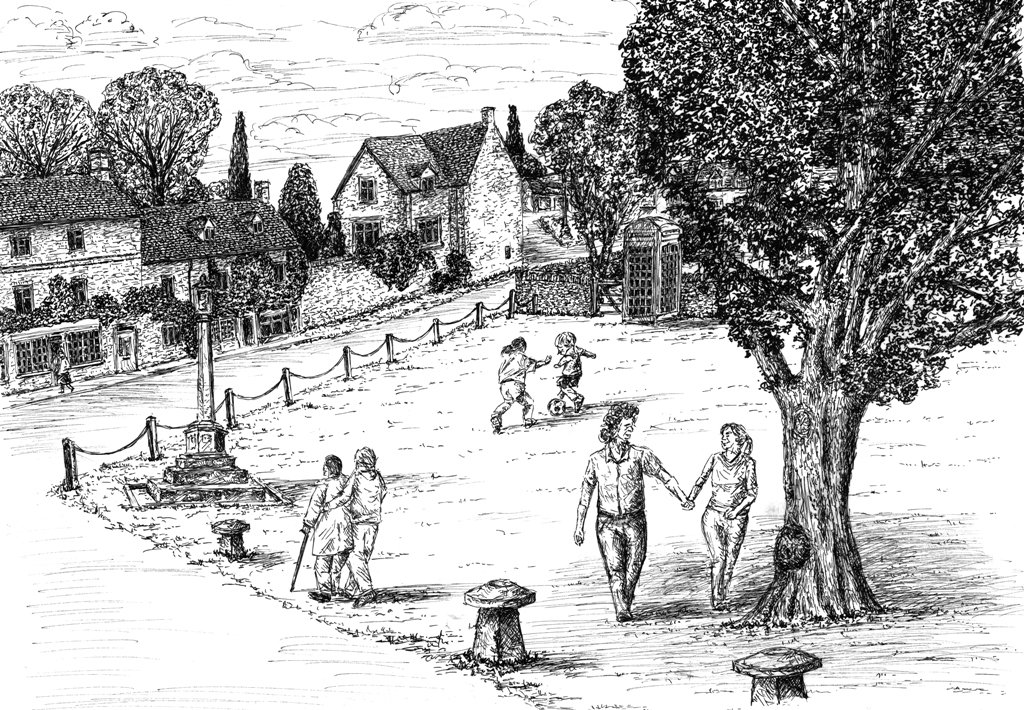
 A dead body on a carnival float at the village show
A dead body on a carnival float at the village show

































